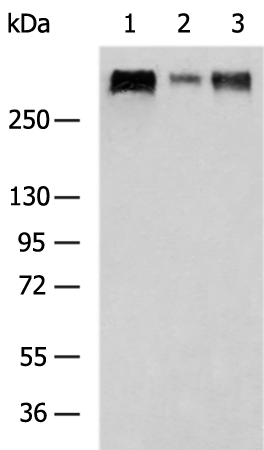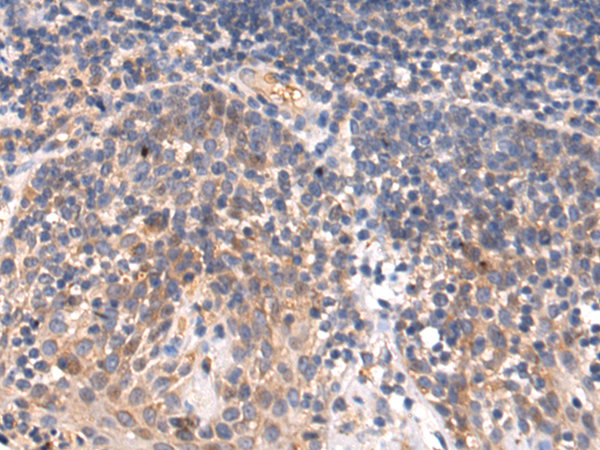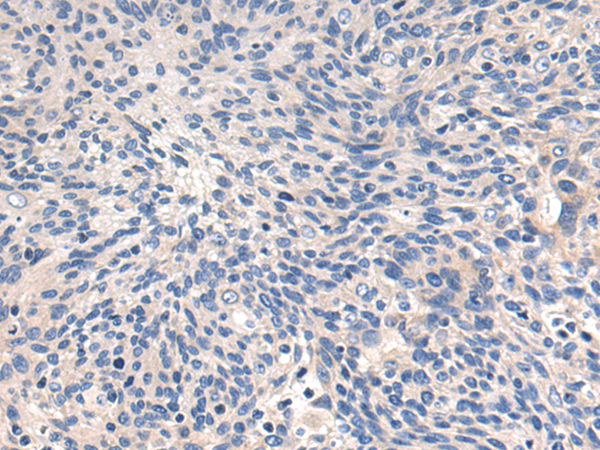


| WB | 咨询技术 | Human,Mouse,Rat |
| IF | 咨询技术 | Human,Mouse,Rat |
| IHC | 1/50-1/100 | Human,Mouse,Rat |
| ICC | 技术咨询 | Human,Mouse,Rat |
| FCM | 咨询技术 | Human,Mouse,Rat |
| Elisa | 1/5000-1/10000 | Human,Mouse,Rat |
| Aliases | NG2; MCSP; MCSPG; MSK16; CSPG4A; HMW-MAA; MEL-CSPG |
| WB Predicted band size | 251 kDa |
| Host/Isotype | Rabbit IgG |
| Antibody Type | Primary antibody |
| Storage | Store at 4°C short term. Aliquot and store at -20°C long term. Avoid freeze/thaw cycles. |
| Species Reactivity | Human, Mouse, Rat |
| Immunogen | Synthetic peptide of human CSPG4 |
| Formulation | Purified antibody in PBS with 0.05% sodium azide and 50% glycerol. |
+ +
以下是3-4条关于CSPG4抗体的参考文献概览(内容基于公开研究整理):
1. **文献名称**:*Targeting CSPG4 in Melanoma via Chimeric Antigen Receptor T Cells*
**作者**:Sato T., et al.
**摘要**:研究利用抗CSPG4的CAR-T细胞靶向黑色素瘤,显示其在小鼠模型中有效抑制肿瘤生长和转移,并验证了CSPG4在黑色素瘤中的高表达。
2. **文献名称**:*CSPG4-Specific Antibody-Drug Conjugate in Glioblastoma*
**作者**:Wang X., et al.
**摘要**:开发针对CSPG4的抗体-药物偶联物(ADC),在胶质母细胞瘤模型中显著诱导肿瘤细胞凋亡,提示CSPG4作为侵袭性脑肿瘤治疗靶点的潜力。
3. **文献名称**:*CSPG4 Antibody Enhances Anti-Tumor Immunity in Triple-Negative Breast Cancer*
**作者**:Tao L., et al.
**摘要**:发现抗CSPG4抗体通过增强抗体依赖性细胞毒性(ADCC)抑制三阴性乳腺癌的进展,并可能逆转免疫抑制微环境。
4. **文献名称**:*CSPG4 in Cancer: Mechanisms and Therapeutic Opportunities*
**作者**:Weiss S.A., et al.
**摘要**:综述CSPG4在多种实体瘤(如肉瘤、黑色素瘤)中的过表达机制,并总结其抗体在免疫治疗、靶向给药中的应用前景。
(注:以上为示例性概括,具体文献需通过PubMed、Google Scholar等平台检索确认。)
CSPG4 (Chondroitin Sulfate Proteoglycan 4), also known as neuron-glial antigen 2 (NG2), is a transmembrane proteoglycan with a large extracellular domain. Initially identified as a marker for oligodendrocyte precursor cells, CSPG4 is overexpressed in various aggressive cancers, including melanoma, glioblastoma, triple-negative breast cancer, and sarcomas. Its role in tumor biology involves promoting cell proliferation, migration, invasion, and angiogenesis through interactions with extracellular matrix components and growth factor signaling pathways (e.g., PDGF, FGF).
CSPG4 antibodies are designed to target this protein for diagnostic and therapeutic purposes. In research, these antibodies are used to detect CSPG4 expression in tumor tissues, aiding in cancer subtype classification and prognosis assessment. Therapeutically, CSPG4-targeting monoclonal antibodies, antibody-drug conjugates (ADCs), and chimeric antigen receptor (CAR) T-cell therapies are under investigation. Preclinical studies highlight their potential to inhibit tumor growth and metastasis by blocking CSPG4-mediated signaling or delivering cytotoxic payloads directly to cancer cells.
Despite promise, challenges include addressing CSPG4’s expression in normal tissues (e.g., pericytes) to minimize off-target effects. Ongoing research aims to optimize antibody specificity and explore combinatorial approaches with immunotherapy or chemotherapy to enhance efficacy in resistant malignancies.
×